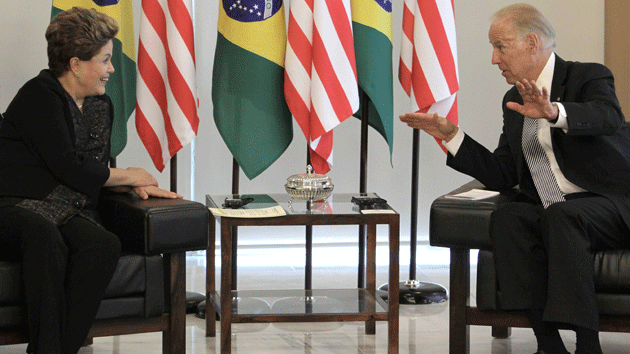
The president of Brazil, Dilma Rousseff speaks with the vice president of the United States, Joe Biden. Eraldo Peres/AP
When Vice President Joe Biden visited Brazil for the start of the World Cup soccer tournament last month, he brought along something of an odd gift for President Dilma Rousseff: a collection of State Department cables and reports that included a chilling account of state-sponsored torture. The documents were from 1967 to 1977 and covered assorted human rights abuses conducted by the military dictatorship then ruling Brazil—a government that was supported by the Nixon administration and its foreign policy poobah Henry Kissinger.
Brazil has been examining its dark past through the work of the Brazilian National Truth Commission, and the 43 documents turned over by Biden are meant to help the commission uncover the dirty deeds of the recent past. As the National Security Archive notes, these records report on “secret torture detention centers in Sao Paulo, the military’s counter-subversion operations, and Brazil’s hostile reaction in 1977 to the first State Department human rights report on abuses.”
And one document stands out: a 1973 cable from the US embassy in Brazil to State Department headquarters titled, “Widespread Arrests and Psychophysical Interrogation of Suspected Subversives.” The report noted that arrests by military forces of regime critics—mostly university students—had recently increased, and that “the detainees are being subjected to an intensive psychophysical system of duress designed to extract information without doing visible, lasting harm to the body.” The cable reported that Brazilians suspected of being “hardened terrorists…are still being submitted to the older methods of physical violence”—such as the use of electrical shock devices and being tied to and hung from a suspended bar—”which sometimes cause death.” But the main point of the cable was that the Brazilian military had developed “a newer, more sophisticated and elaborate psychophysical duress system…to intimidate and terrify the suspect.”
The cable then detailed, in a rather clinical fashion, this process:
The cable noted that detainees with “good connections” inside and outside the government were usually spared this torture.
This document is a rare step-by-step description of government-backed torture. Yet it contained no criticism of the regime or the practice. It reported that public reaction to a recent wave of arrests “has been mild thus far and is likely to continue to be subdued.”
The cable was in sync with the Nixon/Kissinger policy of not getting worked up about torture conducted by military regimes Washington favored. (See Kissinger and Argentina.) And a cable sent to Foggy Bottom a year earlier by William Rountree, then the US ambassador to Brazil, noted that though the US embassy in Brazil had “on appropriate occasion and in appropriate manner” informed the Brazilians that the US government did not condone “excesses in the form practiced in Brazil,” Rountree believed the United States had to make this case without “unduly jeopardizing our relations with this country or causing a counter-productive reaction on the part of the” government of Brazil. In this cable, Rountree said that he strongly supported the State Department’s opposition to legislation then under consideration in Congress that would cut off US funding to Brazil as long as the government engaged in torture.
Rountree explained, “Given Brazilian pride and sensitivity about sovereignty, efforts by any branch of US government or by US political figures to bring pressure on Brazil would not only damage our general relations but, by equating reduction in anti-terror measures with weakness under pressure, could produce opposite of intended result.” In other words, the United States shouldn’t lean too heavily on the torturers of Brazil.
The Brazilian Truth Commission, which has posted the documents Biden handed over, has been at work for two years, and Biden, when he was in Brazil, promised that the Obama administration would mount a broader review of top-secret CIA and Defense Department documents that might be useful to the commission. So the World Cup has given Brazil more than just a soccer tournament; it has highlighted the nation’s effort to come to terms with its recent past of government abuse and violence—and Washington’s own effort to acknowledge its support of that regime.

















